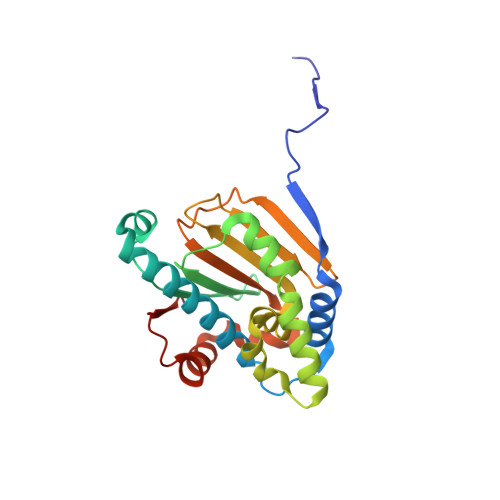Structure-guided design of an Hsp90 beta N-terminal isoform-selective inhibitor.
Khandelwal, A., Kent, C.N., Balch, M., Peng, S., Mishra, S.J., Deng, J., Day, V.W., Liu, W., Subramanian, C., Cohen, M., Holzbeierlein, J.M., Matts, R., Blagg, B.S.J.(2018) Nat Commun 9: 425-425
- PubMed: 29382832
- DOI: https://doi.org/10.1038/s41467-017-02013-1
- Primary Citation of Related Structures:
5UC4, 5UCH, 5UCI, 5UCJ - PubMed Abstract:
The 90 kDa heat shock protein (Hsp90) is a molecular chaperone responsible for folding proteins that are directly associated with cancer progression. Consequently, inhibition of the Hsp90 protein folding machinery results in a combinatorial attack on numerous oncogenic pathways. Seventeen small-molecule inhibitors of Hsp90 have entered clinical trials, all of which bind the Hsp90 N-terminus and exhibit pan-inhibitory activity against all four Hsp90 isoforms. pan-Inhibition of Hsp90 appears to be detrimental as toxicities have been reported alongside induction of the pro-survival heat shock response. The development of Hsp90 isoform-selective inhibitors represents an alternative approach towards the treatment of cancer that may limit some of the detriments. Described herein is a structure-based approach to design isoform-selective inhibitors of Hsp90β, which induces the degradation of select Hsp90 clients without concomitant induction of Hsp90 levels. Together, these initial studies support the development of Hsp90β-selective inhibitors as a method to overcome the detriments associated with pan-inhibition.
- Department of Medicinal Chemistry, The University of Kansas, 1251 Wescoe Hall Drive, Malott Hall 4048, Lawrence, KS, 66045, USA.
Organizational Affiliation:



















